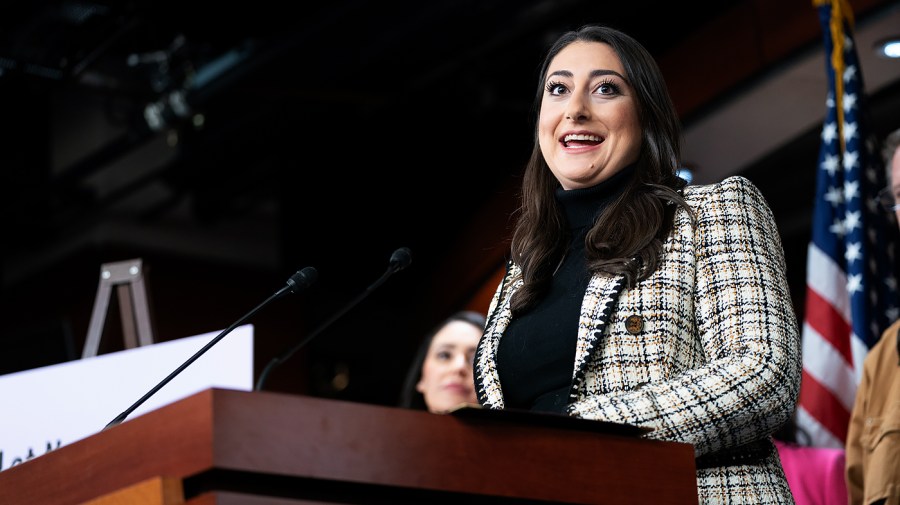
Two House Democrats are looking to block President-elect Trump from enacting another ban on transgender people serving openly in the military, reintroducing legislation Thursday that would prevent the armed forces from hiring or firing someone because of their gender identity or sex characteristics.
Trump, who on the campaign trail last year promised to reinstate a 2017 ban on transgender military service that President Biden repealed in 2021, began drafting an executive order restoring and expanding the policy following his November election win, The Times reported.
At a Turning Point USA event in December, Trump said he will sign an executive order “on day one” to “get transgender out of the military.”
Rep. Sara Jacobs (D-Calif.) and Eric Sorensen’s (D-Ill.) proposal, titled the Ensuring Military Readiness Not Discrimination Act, comes just days before Trump’s Jan. 20 inauguration.
“Kicking nearly 15,000 service members out of the military solely because of their identity would be catastrophic to our military readiness and recruitment,” said Jacobs, a co-chair of the Congressional Equality Caucus’s Transgender Equality Task Force. Her brother, Dylan, is transgender, and another sibling is gender non-conforming.
“Anyone willing and able to sacrifice to defend our country should be able to do so without fear of discrimination—period,” said Sorensen, one of 13 openly LGBTQ lawmakers.
The exact number of openly transgender people serving in the military is unknown; the Department of Defense does not regularly collect data on gender identity.
A 2015 health-related survey conducted by the department found that roughly six in every 1,000 active-duty respondents identified as transgender. A follow-up survey released three years later, in 2018, did not report any information on service members’ gender identity.
The Williams Institute, a public policy research organization affiliated with the UCLA School of Law, estimated in 2014 that roughly 15,500 transgender people were serving on active duty or in the guard or reserve forces, and another 134,000 were veterans. In 2018, the Palm Center, a think tank focused on gender, sexuality and the military, estimated 14,700 transgender troops are serving in the military.
Trump banned transgender service members through a series of tweets in July 2017, writing on Twitter, now called X, that the military “cannot be burdened with the tremendous medical costs and disruption that transgender in the military would entail.” He signed a memo the following month instructing the Department of Defense to stop accepting transgender people who want to enlist in the military, and a department policy issued in 2018 effectively banned trans people from serving at all.
The Palm Center estimated in 2017 that Trump’s policy would cost nearly $1 billion, far more than the roughly $15 million the Pentagon said it spent between 2016 and 2021 on treatment for gender dysphoria — severe distress that stems from a mismatch between a person’s gender identity and sex at birth.
Emily Shilling, president of SPARTA, a transgender military organization that has endorsed Jacobs and Sorensen’s bill, said any similar ban instituted by the incoming Trump administration could cost the government up to $18 billion in lost investments.
“If it were a fairly fast-moving ban, you would be pulling these individuals out of their units, leaving critical gaps in skill sets, experience, and leadership positions that you’re just not going to be able to fill with equivalent people anytime soon, especially given the shortfalls in recruiting,” Shilling told writer Erin Reed in November.
“If the incoming Trump Administration reinstates the transgender military ban and discharges all trans service members, it would take 20 years and cost $18 billion to replace the talent and expertise we’ve lost,” Jacobs said Thursday in a statement, referring to Shilling’s calculation.
Hers and Sorensen’s bill, she said, “would ensure that Donald Trump can’t enact discriminatory policies in the military with the stroke of a pen or a tweet.”
The legislation faces near-impossible odds in the GOP-controlled House, which voted this week to ban transgender student-athletes from competing in women’s sports with the support of two Democrats. Biden signed legislation last month that in part prevents transgender children of service members from accessing gender-affirming care through the military’s health program.
Jacobs told HuffPost Thursday that “it’s doubtful” House Republicans will support her bill, which also failed to clinch any GOP support when Jacobs first introduced it in 2023.
“I know some of my Republican colleagues do really understand the sort of recruitment, retention and readiness challenges that we’re facing,” Jacobs told the outlet, adding, “I’m hopeful, but I think they’re all kind of falling in line at the moment.”
A spokesperson for the California lawmaker said Jacobs and Sorensen are working on collecting new cosponsors, but “we imagine it will be only Democrats who cosponsor it.”
In addition to SPARTA, the bill has the backing of the Human Rights Campaign, the nation’s largest LGBTQ advocacy group, and the Modern Military Association of America, an organization that advocates for LGBTQ military members, veterans and families.












